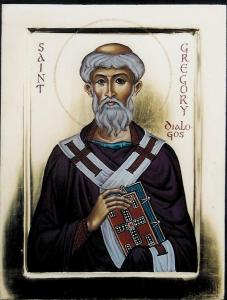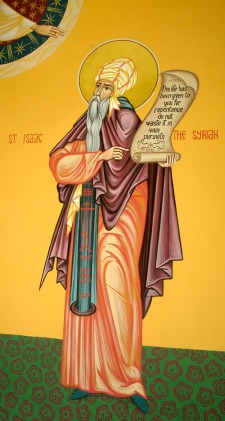 Only the Holy Spirit can purify the intellect, for unless a greater power comes and overthrows the despoiler, what he has taken captive will never be set free (cf Luke 11:21-22).
Only the Holy Spirit can purify the intellect, for unless a greater power comes and overthrows the despoiler, what he has taken captive will never be set free (cf Luke 11:21-22).
In every way, therefore, and especially through peace of soul, we must make ourselves a dwelling-place for the Holy Spirit.
Then we shall have the lamp of spiritual knowledge burning always within us;
and when it is shining constantly in the inner shrine of the soul, not only will the intellect (Greek: ὁ νοῦς)** [see footnote] perceive all the dark and bitter attacks of the demons, but these attacks will be greatly weakened when exposed for what they are by that glorious and holy light.
That is why the Apostle says: ‘Do not quench the Spirit’ (1 Thess. 5:19), meaning: ‘Do not grieve the goodness of the Holy Spirit by wicked actions or wicked thoughts, lest you be deprived of this protecting light.’
The Spirit, since He is eternal and life-creating, cannot be quenched; but if He is grieved – that is if He withdraws – He leaves the intellect without the light of spiritual knowledge, dark and full of gloom.
The loving and Holy Spirit of God teaches us, as we have said, that the perceptive faculty natural to our soul is single; indeed, even the five bodily senses differ from each other only because of the body’s varying needs.
But this single faculty of perception is split because of the dislocation which, as a result of Adam’s disobedience, takes place in the intellect through the modes in which the soul now operates.
Thus one side of the soul is carried away by the passionate part in man, and we are then captivated by the good things of this life, but the other side of the soul frequently delights in the activity of the intellect and, as a result, when we practice self-restraint, the intellect longs to pursue heavenly beauty.
If, therefore, we learn persistently to be detached from the good things of this world, we shall be able to unite the earthly appetite of the soul to its spiritual and intellectual aspiration, through the communion of the Holy Spirit who brings this about within us.
For unless His divinity actively illumines the inner shrine of our heart, we shall not be able to taste God’s goodness with the perceptive faculty undivided, that is, with unified aspiration.
Diadochus of Photiké (c.400-before 486): On Spiritual Perfection chs 28-29, Text from G.E.H. Palmer, Philip Sherrard, and Kallistos Ware (trans. and eds.) The Philokalia: The Complete Text, vol. I (Faber & Faber, London & Boston: 1979).
**The translators of the Philokalia say the following about the word “intellect” as used in this passage from Diadochus and by other Greek authors: INTELLECT (nous): the highest faculty in man, through which – provided it is purified – he knows God or the inner essences or principles of created things by means of direct apprehension or spiritual perception. Unlike the dianoia or reason, from which it must be carefully distinguished, the intellect does not function by formulating abstract concepts and then arguing on this basis to a conclusion reached through deductive reasoning, but it understands divine truth by means of immediate experience, intuition or ‘simple cognition’ (the term used by St Isaac the Syrian). The intellect dwells in the ‘depths of the soul’; it constitutes the innermost aspect of the heart (St Diadochos). The intellect is the organ of contemplation, the ‘eye of the heart’ (Macarian Homilies).
 Whence then cometh wisdom? and where is the place of understanding? Seeing it is hid from the eyes of all living, and kept close from the fowls of the air (Job 28:20-21).
Whence then cometh wisdom? and where is the place of understanding? Seeing it is hid from the eyes of all living, and kept close from the fowls of the air (Job 28:20-21). March 5th is the feast of
March 5th is the feast of  January 17th is the feast of
January 17th is the feast of 










